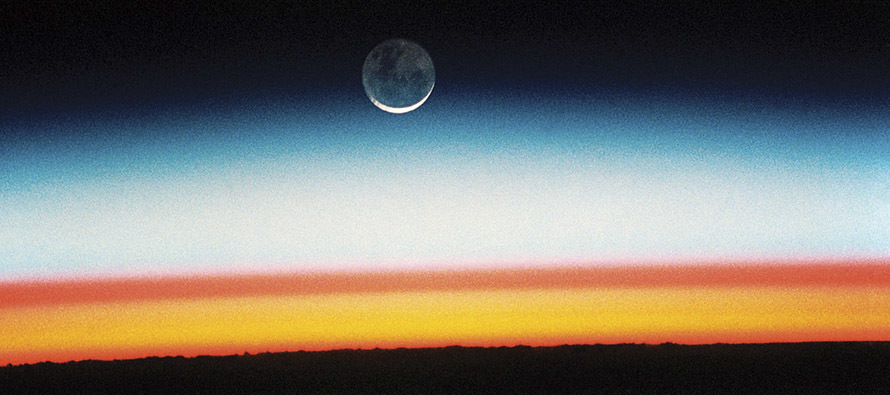What Pope Francis wants you to know about the environment

This photo, taken from the Space Shuttle Columbia in 1992, shows a moonrise and sunrise from outer space. Pope Francis’ environmental vision begins from the perspective of a world without borders that requires action at all levels to repair the damage it has endured. (Photo: NASA)
When Laudato si’ was published in 2015, the world took note. Although the environmental encyclical—like most church documents—builds upon previous statements and teachings of the church, it greatly heightened interest and focus on environmental concerns among Catholics and all other interested parties. Pope Francis addressed it to “every person living on this planet.”
Laudato si’: On Care for Our Common Home is about 150 pages in published book form, so any article that treats its themes cannot capture all its richness. It does not read like a page-turner, but the concentration it demands of readers rewards them with its insights into the world around us, its understanding of the human heart, and its joyful (but not naive) celebration of the natural world.
Here are five of the messages Pope Francis shares in this encyclical.
1. Faith and “real life” are connected.
The very act of writing an encyclical on our care for creation means that Pope Francis, like popes before him, wants Catholics to apply principles from faith to all aspects of life. Our spiritual life is part and parcel of the rest of our life, and it has bearing on how we conduct ourselves in the marketplace, in our relationships, in our politics, and so on.
In fact, so closely intertwined is faith and material reality that Pope Francis spends a good bit of ink explaining that the created world is an embodiment of God in the same way that human life is made in the image and likeness of God.
Our insistence that each human being is an image of God should not make us overlook the fact that each creature has its own purpose. None is superfluous. The entire material universe speaks of God’s love, his boundless affection for us. Soil, water, mountains: everything is, as it were, a caress of God (Laudato si’, sec. 84).
2. The environmental crisis is real and urgent.
Pope Francis recognizes that global warming and other types of environmental degradation are harming the earth and the plants and animals that live on it, including humans. The crisis is not overstated, he emphasizes, and people must face it head on:
As often occurs in periods of deep crisis which require bold decisions, we are tempted to think that what is happening is not entirely clear. Superficially, apart from a few obvious signs of pollution and deterioration, things do not look that serious, and the planet could continue as it is for some time. Such evasiveness serves as a license to carrying on with our present lifestyles and models of production and consumption. This is the way human beings contrive to feed their self-destructive vices: trying not to see them, trying not to acknowledge them, delaying the important decisions and pretending that nothing will happen (Laudato, sec. 59).
In the first chapter, “What is happening to our common home,” the pope looks at pollution, global warming, loss of biodiversity, and water purity and access. He connects those issues to global inequality and declines in the quality of human life for many, with the poor being the hardest hit.
The human environment and the natural environment deteriorate together; we cannot adequately combat environmental degradation unless we attend to causes related to human and social degradation. In fact, the deterioration of the environment and of society affects the most vulnerable people on the planet: “Both everyday experience and scientific research show that the gravest effects of all attacks on the environment are suffered by the poorest” (sec. 48).
3. The environmental crisis has human roots.
In particular, Francis says our craving for consumer goods, for our own convenience and our own (albeit temporary) comfort, has negative environmental impacts. Technology should not be blindly embraced but rather seen as valuable when it enhances human life and the common good.
But a sober look at our world shows that the degree of human intervention, often in the service of business interests and consumerism, is actually making our earth less rich and beautiful, ever more limited and grey, even as technological advances and consumer goods continue to abound limitlessly (sec. 34).
Obsession with a consumerist lifestyle, above all when few people are capable of maintaining it, can only lead to violence and mutual destruction (sec. 204).
Yet all is not lost. Human beings, while capable of the worst, are also capable of rising above themselves, choosing again what is good, and making a new start, despite their mental and social conditioning (sec. 205).
A ruined natural environment, Francis says, is closely connected to aspects of our culture that are in ruins: weak families, dysfunctional governments, immoral businesses.
If everything is related, then the health of a society’s institutions has consequences for the environment and the quality of human life. “Every violation of solidarity and civic friendship harms the environment.” In this sense, social ecology is necessarily institutional, and gradually extends to the whole of society, from the primary social group, the family, to the wider local, national and international communities.
Our difficulty in taking up this challenge seriously has much to do with an ethical and cultural decline, which has accompanied the deterioration of the environment. Men and women of our postmodern world run the risk of rampant individualism, and many problems of society are connected with today’s self-centered culture of instant gratification. We see this in the crisis of family and social ties and the difficulties of recognizing the other (sec. 162).
4. Hope prevails: Individual and collective action can help.
Healing the planet begins in our hearts and homes and extends into our jobs, policy-making, and more, says Francis.
Although the post-industrial period may well be remembered as one of the most irresponsible in history, nonetheless there is reason to hope that humanity at the dawn of the twenty-first century will be remembered for having generously shouldered its grave responsibilities (sec. 165).
... A path of productive development, which is more creative and better directed, could correct the present disparity between excessive technological investment in consumption and insufficient investment in resolving urgent problems facing the human family (sec. 192).
Furthermore, by focusing on our vocations (how we use our God-given talents), we can be part of the process of healing the planet.
5. Contemplate, celebrate, and rest.
Yes, you read that right. Pope Francis ends his lengthy, intricate letter reminding us that a connection exists between a sense of celebration and festivity and our honor for God, nature, and the Eucharist. Furthermore he reminds us that we need to guard the Sabbath, using it to rest and worship. Doing so will renew us in our commitment to nurture both creation and human dignity.
The sacraments are a privileged way in which nature is taken up by God to become a means of mediating supernatural life. Through our worship of God, we are invited to embrace the world on a different plane. Water, oil, fire and colors are taken up in all their symbolic power and incorporated in our act of praise.
. . . Christian spirituality incorporates the value of relaxation and festivity. We tend to demean contemplative rest as something unproductive and unnecessary, but this is to do away with the very thing which is most important about work: its meaning. . . . . Rest opens our eyes to the larger picture and gives us renewed sensitivity to the rights of others. And so the day of rest, centered on the Eucharist, sheds it light on the whole week, and motivates us to greater concern for nature and the poor (sec. 237).
The mission to care for creation is part of each human being’s essential vocation. As Pope Francis puts it in the final paragraph of Laudato si’: “God, who calls us to generous commitment and to give him our all, offers us the light and the strength needed to continue on our way. . . . His love constantly impels us to find new ways forward. Praise be to him!”
Related article: VocationNetwork.org, “Catholic social teaching: a guide.”
Tags
Related
- What Catholics believe about the Eucharist
- How Jesus embraced his call
- Prayer: Our never-ending conversation with God
- What the church is teaching—and learning—about the sin of racism
- Church defined: Jesus calls; we respond
- A Creed to believe in
- On whose authority?
- Ten great things about being Catholic
- Following Jesus: Be ready for some surprises
- Enter into the divine Read More
Most Viewed
- Find your spirituality type quiz
- FAQs: Frequently asked questions about vocations
- Celibacy quiz: Can you live a celibate life?
- Resources for older discerners or those with physical and developmental differences
- About Vocation Network and VISION Guide


